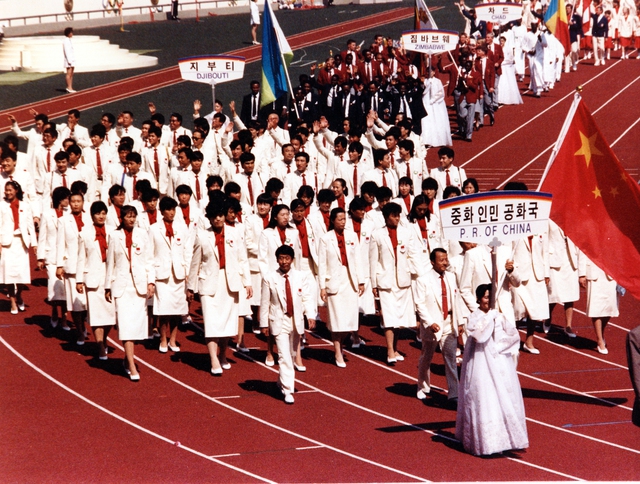 |
|
Chinese athletes during the 1988 Seoul Olympics.
|
Beijing had discussions with Pyongyang, but the latter refused
While South and North Korea never got to co-host the 1988 Olympics, the issues addressed in the two sides’ discussions leading up to the event included some of the same forward-looking measures they are currently pursuing 30 years later, including linkages of roads, railways and ports and guarantees on free transit. China was also confirmed for the first time to have held discussions with the North toward sending its Olympic squad to the event by train over Panmunjom. The details were included in 1,602 volumes of documents (around 250,000 pages) dating back 30 years or more that were made public on Mar. 31 by the South Korean Ministry of Foreign Affairs. According to an August 1988 diplomatic cable by the South Korean acting ambassador to Pakistan at the time, Councilor Xiao Zhongchu from the Chinese embassy had been providing South Korea with important tips regarding China’s plans to send its Olympics squad to Seoul by rail through North Korea and Panmunjom. Xiao reported China as having “held discussions with the North” on the matter, but said Pyongyang had “adamantly refused.” While the exact date and content of the North Korea-China discussions were not confirmed, they are believed to have taken place after mid-January 1988, when China gave official notification of its participation in the Seoul Olympics. Pyongyang is very likely to have refused the request to allow the Chinese squad to pass through because it had declared its own boycott of the games two days prior to China’s announcement. China ultimately sent a squad of nearly 300 members to the Seoul Olympics by airplane. Also notable is the personal message reportedly relayed to then North Korean leader Kim Il-sung the same June by then Chinese President Deng Xiaoping via the North Korean embassy in Beijing. While it is unclear whether the message was in document or spoken form, the content was reportedly as “request for North Korea’s cooperation with global efforts to stage a peaceful Olympics.” The message was conveyed to the South Korean embassy in the US by a US State Department official on July 17, 1988. After initially opposing Seoul’s selection in September 1981 as host city for the 24th Summer Olympics, North Korean began calling for an inter-Korean co-hosting arrangement in July 1985. During four rounds of International Olympic Committee-mediated inter-Korean athletic talks in Lausanne between 1985 and 1987, discussions were held on the linking of roads and railways between Seoul and Pyongyang and the establishment of a passenger ferry course between the ports of Nampo and Incheon. During the third round of talks in Lausanne in June 1986, the two sides agreed to a plan for free transit, with North Korea announcing that it would open its borders to 25,000 members of the “Olympic family” including journalists, athletes, officials and international sport federations. The dates of the border opening were also set between two weeks prior to the Olympics and the time of the event’s closing. Then IOC president Juan Antonio Samaranch, who was mediating the discussions, was reportedly convinced that the opening of North Korea’s borders would not actually happen, but insisted on the inter-Korean talks as a way of encouraging the Soviet Union and other socialist countries to take part in the Seoul Olympics. By Kim Ji-eun, Park Min-hee and Noh Ji-won, staff reporters Please direct comments or questions to [english@hani.co.kr]






